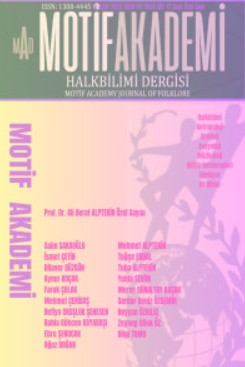G. HOFSTEDE’NİN ERİLLİK-DİŞİLLİK (MASCULİNİTY) FAKTÖRÜ TÜRKİYE ANALİZİNİN TÜRK HALK BİLGİSİ AÇISINDAN DEĞERLENDİRİLMESİ
G. HOFSTEDE'S MASCULINITY FACTOR EVALUATION OF TURKEY ANALYSIS IN TERMS OF TURKISH FOLK KNOWLEDGE
Author(s): Refiye Şenesen OkuşlukSubject(s): Gender Studies, Customs / Folklore, Sociology of Culture
Published by: Motif Halk Oyunları Eğitim ve Öğretim Vakfı
Keywords: Turkish Folk Culture; Folklore; G. Hofstede; Masculinity/Femininity Dimensions; Intercultural Communication;
Summary/Abstract: Different scientists have made different classifications regarding the dimensions of cultural differentiation. G. Hofstede is a social psychologist and a leading expert in organizational sociology in the field of intercultural communication. He presented five parameters to explain cultures, which he divided into two: national and organizational. These are power distance, individualism/pluralism, masculinity/femininity, uncertainty avoidance, and long/short term orientation. According to the parameter titled Masculinity, for example, in societies where masculine culture is dominant, there is a clear distinction between male and female roles. In societies where feminine culture dominates, interpersonal harmony and agreement are important. Instead of going to conflict, they resort to cover-up. In this study, G. Hofstede's Turkish analysis of the cultural dimension of "Masculinity-Femininity" was examined and then it was tried to determine how the trends and practices that provided the data for this analysis correspond to Turkish folklore and practices. Sample practices reveal that Turkish society imposes feminine values on individuals from the very beginning through traditions, customs and practices.
Journal: Motif Akademi Halkbilimi Dergisi
- Issue Year: 17/2024
- Issue No: Sp. Issue
- Page Range: 90-103
- Page Count: 14
- Language: Turkish

